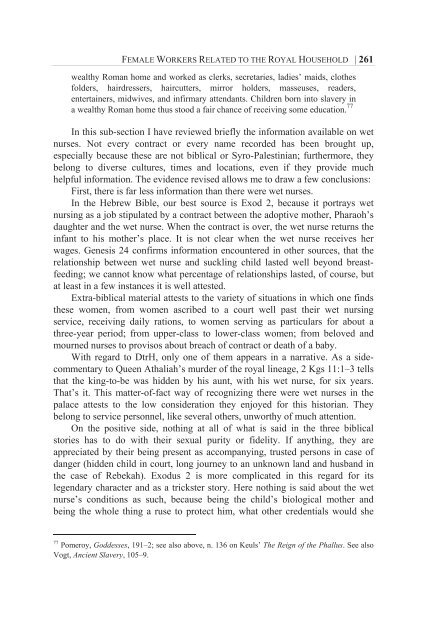Women at Work in the Deuteronomistic History - International Voices ...
Women at Work in the Deuteronomistic History - International Voices ...
Women at Work in the Deuteronomistic History - International Voices ...
You also want an ePaper? Increase the reach of your titles
YUMPU automatically turns print PDFs into web optimized ePapers that Google loves.
FEMALE WORKERS RELATED TO THE ROYAL HOUSEHOLD | 261<br />
wealthy Roman home and worked as clerks, secretaries, ladies’ maids, clo<strong>the</strong>s<br />
folders, hairdressers, haircutters, mirror holders, masseuses, readers,<br />
enterta<strong>in</strong>ers, midwives, and <strong>in</strong>firmary <strong>at</strong>tendants. Children born <strong>in</strong>to slavery <strong>in</strong><br />
a wealthy Roman home thus stood a fair chance of receiv<strong>in</strong>g some educ<strong>at</strong>ion. 77<br />
In this sub-section I have reviewed briefly <strong>the</strong> <strong>in</strong>form<strong>at</strong>ion available on wet<br />
nurses. Not every contract or every name recorded has been brought up,<br />
especially because <strong>the</strong>se are not biblical or Syro-Palest<strong>in</strong>ian; fur<strong>the</strong>rmore, <strong>the</strong>y<br />
belong to diverse cultures, times and loc<strong>at</strong>ions, even if <strong>the</strong>y provide much<br />
helpful <strong>in</strong>form<strong>at</strong>ion. The evidence revised allows me to draw a few conclusions:<br />
First, <strong>the</strong>re is far less <strong>in</strong>form<strong>at</strong>ion than <strong>the</strong>re were wet nurses.<br />
In <strong>the</strong> Hebrew Bible, our best source is Exod 2, because it portrays wet<br />
nurs<strong>in</strong>g as a job stipul<strong>at</strong>ed by a contract between <strong>the</strong> adoptive mo<strong>the</strong>r, Pharaoh’s<br />
daughter and <strong>the</strong> wet nurse. When <strong>the</strong> contract is over, <strong>the</strong> wet nurse returns <strong>the</strong><br />
<strong>in</strong>fant to his mo<strong>the</strong>r’s place. It is not clear when <strong>the</strong> wet nurse receives her<br />
wages. Genesis 24 confirms <strong>in</strong>form<strong>at</strong>ion encountered <strong>in</strong> o<strong>the</strong>r sources, th<strong>at</strong> <strong>the</strong><br />
rel<strong>at</strong>ionship between wet nurse and suckl<strong>in</strong>g child lasted well beyond breastfeed<strong>in</strong>g;<br />
we cannot know wh<strong>at</strong> percentage of rel<strong>at</strong>ionships lasted, of course, but<br />
<strong>at</strong> least <strong>in</strong> a few <strong>in</strong>stances it is well <strong>at</strong>tested.<br />
Extra-biblical m<strong>at</strong>erial <strong>at</strong>tests to <strong>the</strong> variety of situ<strong>at</strong>ions <strong>in</strong> which one f<strong>in</strong>ds<br />
<strong>the</strong>se women, from women ascribed to a court well past <strong>the</strong>ir wet nurs<strong>in</strong>g<br />
service, receiv<strong>in</strong>g daily r<strong>at</strong>ions, to women serv<strong>in</strong>g as particulars for about a<br />
three-year period; from upper-class to lower-class women; from beloved and<br />
mourned nurses to provisos about breach of contract or de<strong>at</strong>h of a baby.<br />
With regard to DtrH, only one of <strong>the</strong>m appears <strong>in</strong> a narr<strong>at</strong>ive. As a sidecommentary<br />
to Queen Athaliah’s murder of <strong>the</strong> royal l<strong>in</strong>eage, 2 Kgs 11:1–3 tells<br />
th<strong>at</strong> <strong>the</strong> k<strong>in</strong>g-to-be was hidden by his aunt, with his wet nurse, for six years.<br />
Th<strong>at</strong>’s it. This m<strong>at</strong>ter-of-fact way of recogniz<strong>in</strong>g <strong>the</strong>re were wet nurses <strong>in</strong> <strong>the</strong><br />
palace <strong>at</strong>tests to <strong>the</strong> low consider<strong>at</strong>ion <strong>the</strong>y enjoyed for this historian. They<br />
belong to service personnel, like several o<strong>the</strong>rs, unworthy of much <strong>at</strong>tention.<br />
On <strong>the</strong> positive side, noth<strong>in</strong>g <strong>at</strong> all of wh<strong>at</strong> is said <strong>in</strong> <strong>the</strong> three biblical<br />
stories has to do with <strong>the</strong>ir sexual purity or fidelity. If anyth<strong>in</strong>g, <strong>the</strong>y are<br />
appreci<strong>at</strong>ed by <strong>the</strong>ir be<strong>in</strong>g present as accompany<strong>in</strong>g, trusted persons <strong>in</strong> case of<br />
danger (hidden child <strong>in</strong> court, long journey to an unknown land and husband <strong>in</strong><br />
<strong>the</strong> case of Rebekah). Exodus 2 is more complic<strong>at</strong>ed <strong>in</strong> this regard for its<br />
legendary character and as a trickster story. Here noth<strong>in</strong>g is said about <strong>the</strong> wet<br />
nurse’s conditions as such, because be<strong>in</strong>g <strong>the</strong> child’s biological mo<strong>the</strong>r and<br />
be<strong>in</strong>g <strong>the</strong> whole th<strong>in</strong>g a ruse to protect him, wh<strong>at</strong> o<strong>the</strong>r credentials would she<br />
77<br />
Pomeroy, Goddesses, 191–2; see also above, n. 136 on Keuls’ The Reign of <strong>the</strong> Phallus. See also<br />
Vogt, Ancient Slavery, 105–9.




